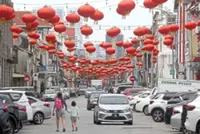GEORGE TOWN: Once a popular place for people to get traditional herbs, a century-old medical hall here now stands mostly quiet with the shelves lined with jars meant more for show than trade.
“We stopped selling Chinese herbs in 2014,” said Liew Kong Choy, who has run the shop in Chulia Street for decades.
“Too expensive. The stuff from China got too costly.”
These days, Liew sells balm, oil and a few home remedies to the elderly who still walk in.
But not many do these days.
“Young people go to pharmacies now,” he said. “They don’t believe in this like their parents did.”
Decades ago, medical halls were common here, and anyone feeling sick would go and get herbs.
Now, they are vanishing. It is partly due to the escalating cost.
“Red dates, wolfberries, ginseng and most Chinese herbs have gone up by 10% to 15% over the past six months,” said Teoh Hai Wei, 43, who still runs a hall nearby.
“Some of the prices vary and depend on the season, some just follow China.”
He said supply problems and shifting demand made the trade harder to manage.
Penang wholesaler Lai Ee Li compared the business to the stock market.
“Prices change every few months,” she said. “Before Chinese New Year, they go up. After that, they drop.
“Depends on the season, what illnesses are spreading and what people think will work.”
She said demand for tiger milk mushroom increases when there’s a spike in respiratory illness. That means the price jumps in tandem.
Other items that have recently gone up include chrysanthemum, lo han guo, barley and hei ko – all rising by between 5% and 15% in bulk.
Even so, Chinese patent medicine still sells, though the numbers have been volatile.
In 2022, China exported traditional Chinese medicine worth US$54.2mil (RM230.4mil) to Malaysia – a 138% jump over the previous year.
But in 2023, the figure fell to US$32.5mil (RM138.2mil), a 40% drop.
“2022 was a surge year because people turned to traditional Chinese medicine during the Covid-19 pandemic,” said Malaysian Chinese Medical Association president Heng Aik Teng.
“2023 was more of a correction.”
He said rising costs in China also pushed up prices and made it harder for exporters.
Demand in the region, especially in price-sensitive countries, has dropped since the pandemic.
Back in Chulia Street, Liew doesn’t talk about global trade figures.
He just sees fewer people walk past his door.
“I’m still here. But it’s not like before,” he said.





